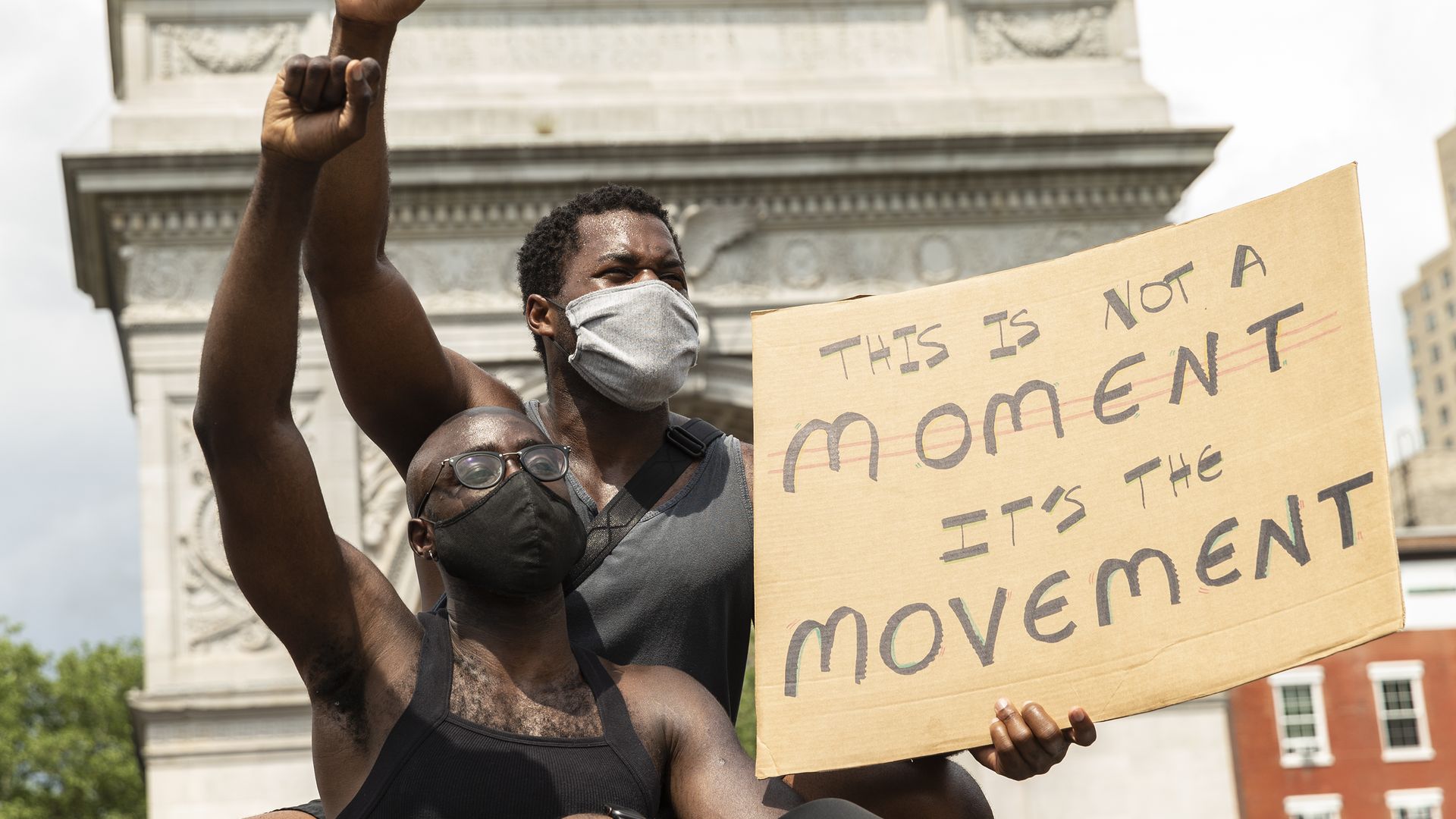Poll: Black Americans harbor little hope for change despite clear vision for equality
Add Axios as your preferred source to
see more of our stories on Google.

Protesters gather for s peaceful rally and march in support of Black Lives Matter movement at Washington Square Park in New York City on June 6, 2020. Photo: Lev Radin/Pacific Press/LightRocket via Getty Images
Two years after Black Lives Matter protests swept across the country, Black Americans surveyed see little improvement in their lives, according to a new poll published Tuesday by the Pew Research Center.
Driving the news: Black Americans have a clear vision for how to achieve equality — including supporting Black businesses and institutional changes — but remain skeptical that the U.S. will get there.
State of play: 64% of Black Americans polled say the increased focus on issues of race and racial inequality has not led to changes that improve Black people's lives.
- Black people (31%) are less likely than Americans overall (40%) to say that the increased focus has led to marked improvements.
- When asked the same question in 2020, 56% of Black Americans polled said it would lead to improvements for Black people.
The majority of Black adults say racism and police brutality are "extremely big" problems for Black people in the U.S. today. Economic inequality, the affordability of health care and efforts to limit voting ranked third through fifth.
- 79% say they have personally experienced discrimination or been treated unfairly because of their race or ethnicity. Nearly 7 in 10 say discrimination is the main reason Black people can't get ahead.
- About 9 in 10 Black Americans believe multiple aspects of the criminal justice system need some kind of change to ensure fair treatment — nearly all say this about policing (95%), the courts and judicial process (95%), and the prison system (94%).
- A large majority (77%) also think descendants of enslaved people should be repaid in some way, a view that's shared across party lines.
Yes, but: Only 13% say equality for Black people is extremely or very likely.
The intrigue: Black Democrats are more likely to support systemic changes while Black Republicans are more likely to support individualistic changes, but they share similar views on police funding.
- Only 24% of Black Democrats and 21% of Black Republicans say funding for police departments in their communities should decrease.
Worth noting: Black adults under 30 are among the least likely to believe voting is an extremely or very effective path toward equality in the U.S.
What they're saying: "On the one hand, Black Americans have very clear ideas in terms of what pathways for equality would look like for them; they show support for specific approaches," Kiana Cox, a Pew research associate, told Axios.
- "On the flip side of that, they're very skeptical that they'll see any of those changes happen."
- Cox noted that what stood out to her "was the clarity with which Black adults say, 'Yes, we support reparations. Yes, we think that these institutions should not only have major changes but that they can be completely rebuilt.'"
- Yet "no more than 20% of Black adults said that any of these institutional changes would happen," Cox added.
The big picture: After centuries of oppression, racial disparities remain the norm in America.
- The homeownership gap between Black and white Americans is worse today than decades ago when race-based housing laws and policies were in place.
- Black Americans are more likely to get federal life sentences than whites or Latinos, an analysis published in Criminology found.
- A November report from the Commonwealth Fund found that in almost every state, Black Americans were more likely than white Americans to die from preventable and treatable health conditions.
- The Black Lives Matter movement continues to put a spotlight on these issues — with a reach around the globe.
Go deeper: America's reckoning on race highlights the slow wheels of justice
Methodology: This poll was conducted Oct. 4-17, 2021 via an online survey of 3,912 Black U.S. adults. Black U.S. adults include those who are single-race, non-Hispanic Black Americans; multiracial non-Hispanic Black Americans; and adults who indicate they are Black and Hispanic. Respondents were recruited through national, random sampling of residential addresses.
